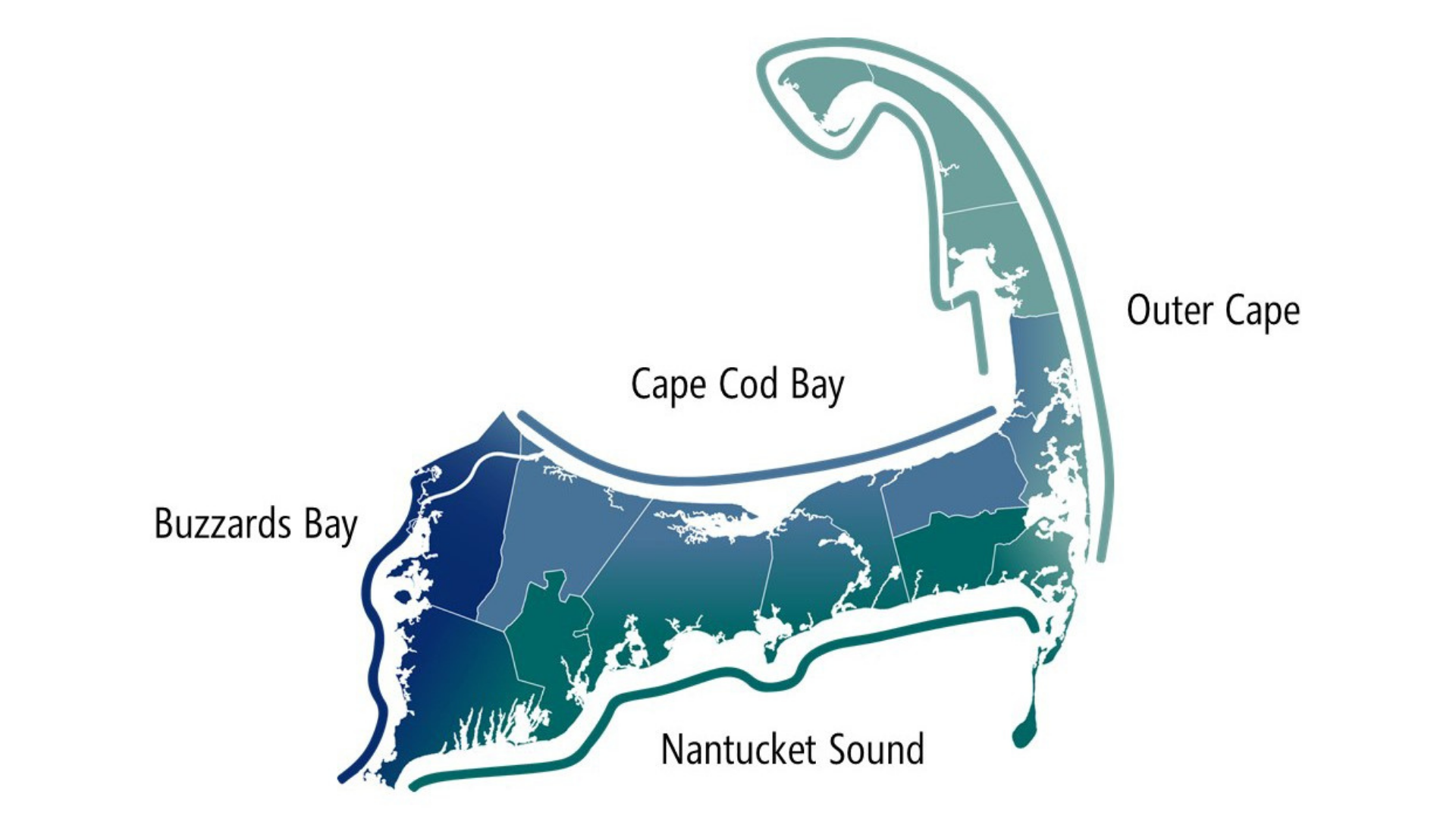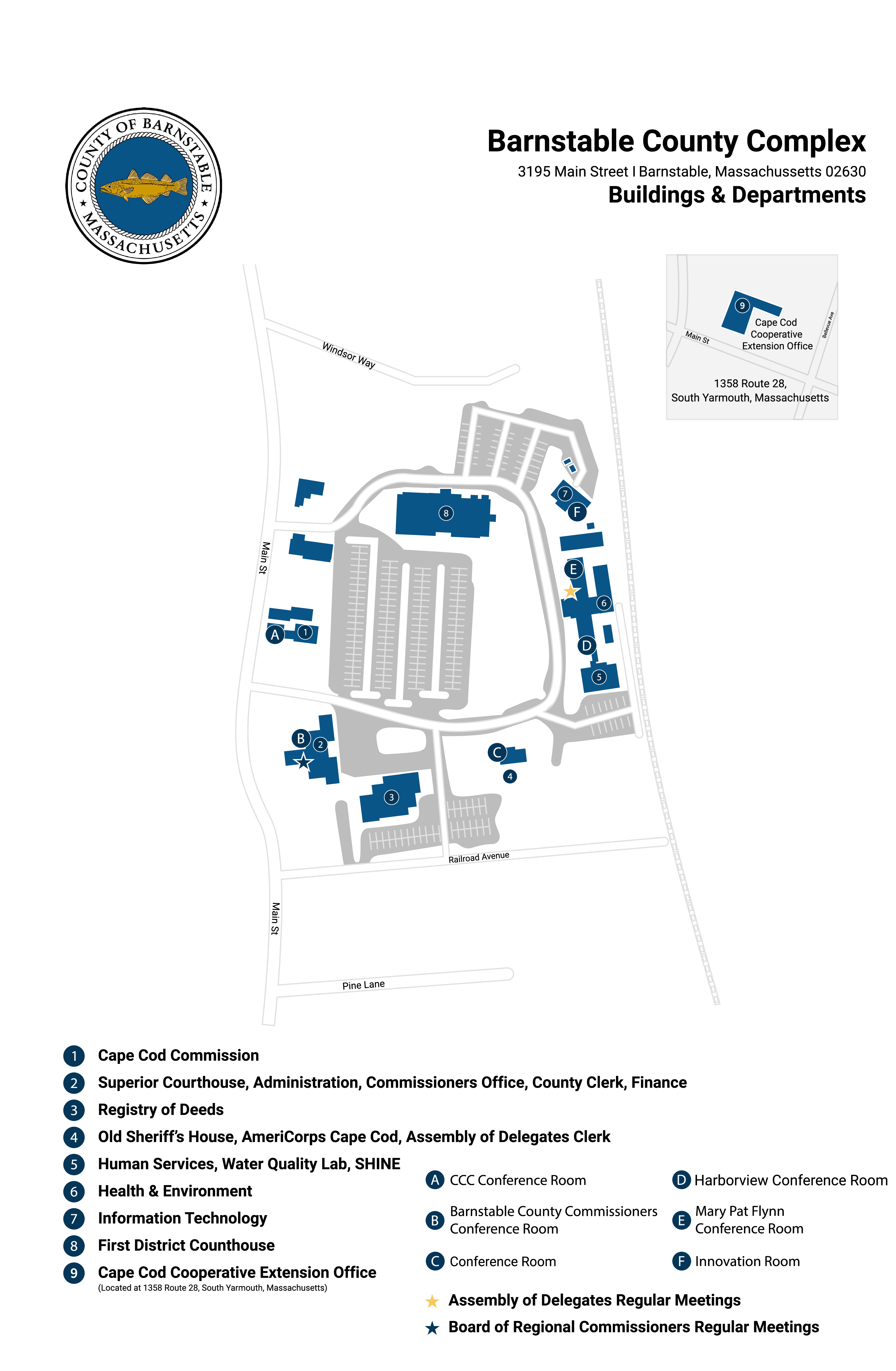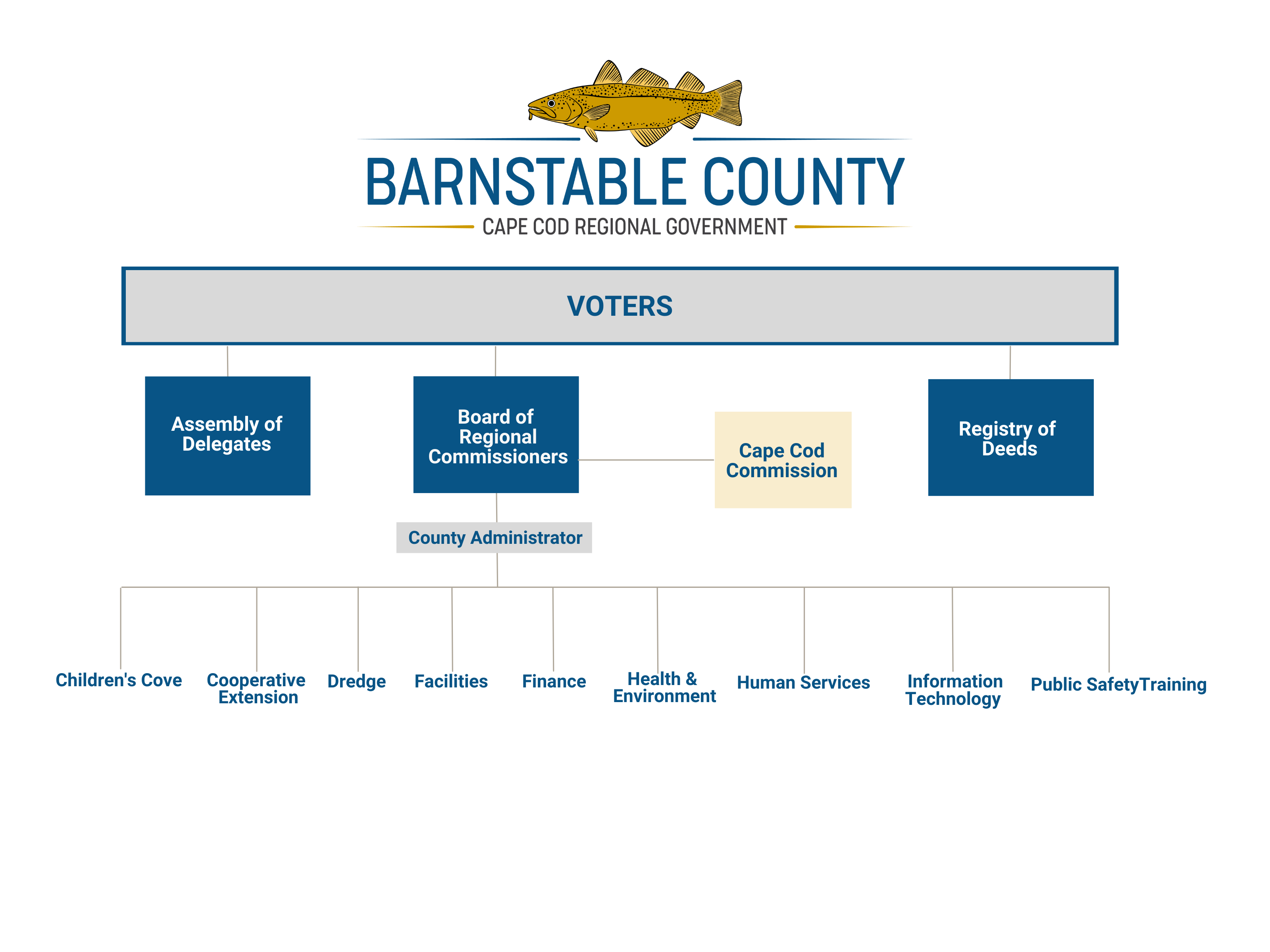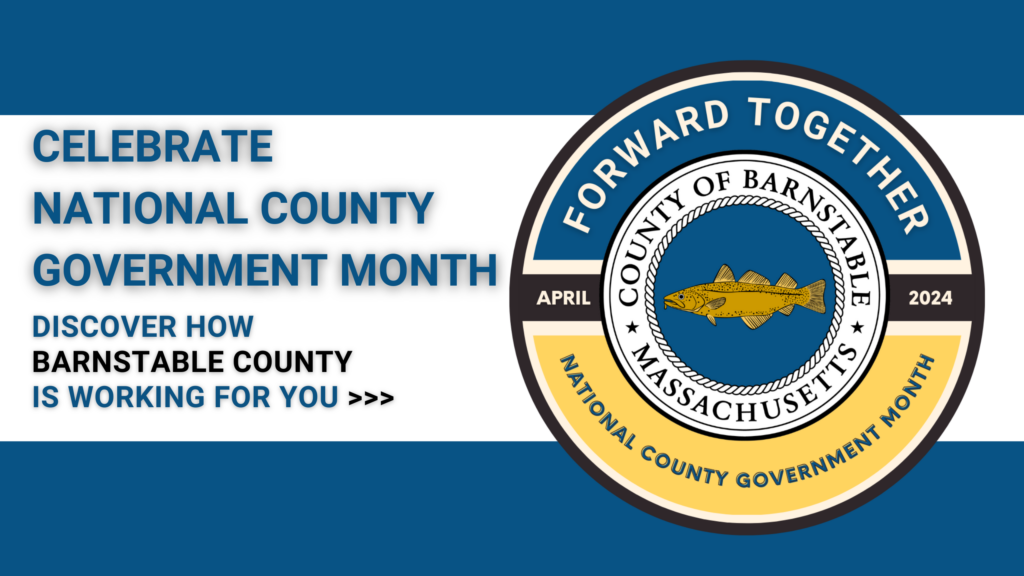
About the County
Barnstable County’s Mission
“We the people of Barnstable County, in order to gain for ourselves and for our communities, all of the rights, powers, privileges, duties, and obligations which may now or in the future be derived from a regional government providing extensive services to its region known as Barnstable County and being fiscally sound, do reestablish for ourselves and for our communities the means and the structure to deal with regional issues which transcend the existing boundaries of municipal governments.” – Barnstable County Home Rule Charter November 8, 1988
Geography and Population
The County is comprised of fifteen towns and covers all of the land area typically identified as Cape Cod. Cape Cod and Barnstable County refer to the same area. With 228,996 people, Barnstable County is the 9th most populated county in the state of Massachusetts out of 14 counties (2020 U.S. Census). In 2020, Barnstable County had the fourth-highest in migration in the country (U.S. Postal Service).

CAPE COD, a narrow, sandy peninsula in southeastern Massachusetts bounded by Nantucket Sound, Cape Cod Bay, and the Atlantic Ocean, which over 220,000 people now call home year-round, has a history shaped by the ocean’s vastness surrounding it.
Long before the Pilgrims arrived, the Wampanoag people, also known as the People of the First Light, Algonquian-speaking North American indigenous people, had inhabited present-day Massachusetts and Eastern Rhode Island for more than 12,000 years. They were part of a rich tapestry of various tribes, societies, and cultures, numbering many times those present today. You can read more about their history “OUR”STORY: 400 Years of Wampanoag History – Plymouth 400, Inc. (plymouth400inc.org)
In 1620, European settlers known as the pilgrims traveled to North America on a rented cargo ship called the Mayflower from Plymouth, England, departing in September 1620 and arriving on American soil three months later in November.
While the Pilgrims ultimately settled in Plymouth, they first reached the shores at the tip of Cape Cod in Provincetown. On board the ship, during their five-and-a-half week stay there, all the free adult men aboard signed the Mayflower Compact on November 11, 1620, establishing colonial self-government.
An exploring party arrived in the Plymouth area on December 21, and the seat of Plymouth Colony was established there. The Colony encompassed the area along the shore of Plymouth Harbor, from Powder Point to Eel River, also extending from Cape Cod Bay on the east to Narragansett Bay on the west and running north to a line negotiated with the Massachusetts Bay Colony in 1639. As far as the laws of England were concerned, this area was under the political jurisdiction of Plymouth Colony.
Barnstable County was officially established on June 2, 1685, when Plymouth Colony was partitioned into Plymouth, Bristol, and Barnstable counties.
Barnstable County included the following towns on June 2, 1685:
- Sandwich (1639)
- Yarmouth (1639)
- Eastham (1646)
- Barnstable (1650)
After much deliberation, the Town of Barnstable was chosen to serve as the “shire” town, owing to its strategic location. Barnstable Village was recognized as the County seat.
Route 6A, formerly known as the Old King’s Highway, runs through Barnstable Village and is located within the Town of Barnstable, which in turn is located within Barnstable County.
In those early days counties had a purely judicial duty, but over the years other duties were added, such as operating prison systems, overseeing health facilities, roadways, agricultural land, and land and deeds records, operating as administrative subdivisions of the state government in carrying out these responsibilities. Elections for county authorities, such as county commissioners, treasurers, district attorneys, sheriffs, clerks of court, registers of deeds, and probate registers were mandated by state law.
Assembly of Delegates and Board of Regional Commissioners
The Barnstable County Home Rule Act of 1988 created a legislative body with authority to make local regulations and provided the County with some rights of self-government.
The Barnstable County Charter has the following provisions:
- Creation of a legislative branch with authority to adopt municipal ordinances, the Assembly of Delegates (a delegate from each of the 15 towns)
- Creation of an executive branch in charge of supervising and directing the activities of all Cape Cod regional government entities, the Barnstable County Commissioners
- Creation of municipal petition and citizen’s initiative processes.
Read the The Barnstable County Charter
The Cape Cod Commission
Cape Cod experienced an unprecedented growth boom throughout the 1980s which prompted the Massachusetts state legislature to pass the Cape Cod Commission Act in 1989. The Act was signed into law by the Governor in January 1990 and found that the region known as Cape Cod (Barnstable County) “possesses unique natural, coastal, historical, cultural, and other values that are threatened by uncoordinated or inappropriate uses of the region’s land and other resources.”
The Cape Cod Commission was established as a regional land use planning, economic development, and regulatory agency with regulatory powers in 1990; although it is an agency of Barnstable County regional government, it is funded separately through the Cape Cod Environmental Protection Fund and supplemented by grants.
Services the County Provides
Today, Barnstable County provides a broad array of services to municipalities and individuals. These services are helpful to the 15 towns on Cape Cod. All the services provided by County departments aim to benefit County’s citizens as a whole, while saving local town governments money. Examples of services are:
- Adult nutrition education
- Affordable housing, economic development, regional transportation services, and coastal resiliency (Cape Cod Commission)
- AmeriCorps Cape Cod Program: Supports all Cape towns; provides natural resource management and other services
- AquiFund program assists owners of failed residential septic systems
- Bathing beach monitoring program: Beach and pond water sampling for quality testing at 350 sites during summer months
- Children’s Cove: Compassionate child sexual abuse services and advocacy
- Coastal resources: flood-plain planning, guides towns through FEMA planning programs to reduce insurance premiums for Cape homeowners
- Dredge services: County dredges at a reduced rate in all Cape coastal areas
- Emergency planning: County coordinates services to address weather and public health emergencies, including managing regional shelters
- Entomology services by County entomologist including tick identification, prevention and testing
- Fire and Rescue Training program provides regional public safety training
- Food safety training for restaurants to reduce food-borne illness; teaches proper sanitation measures
- Hoarding task force assists those struggling with this complex problem
- Horticulture services and classes including guidance from master gardeners
- Human services addresses opioid crisis through Narcan distribution, homelessness programs, education for seniors on Medicare options through SHINE program
- Insect identification services and pest management solutions for residents and businesses
- Landfill monitoring
- Logistical services to town boards of health
- Massachusetts Alternative Septic System Program: Conducts research on septic technologies
- Municipal shellfish propagation: County offers group buying program to purchase young oysters and other shellfish in addition to shellfish workshops and training
- Municipal waste and recycling program support
- Procurement: County offers bulk purchased to towns, maximizes buying potential
- Public health nursing and immunizations
About the Registry of Deeds
The Registry of Deeds is a county office operated under the supervision of the Register of Deeds who is an elected county official. By virtue of their office, the Register of Deeds is also an Assistant Recorder of the Massachusetts Land Court. All transactions recorded in the land court section of the Registry deal with registered land, the title to which is insured by the Commonwealth.
The Registry of Deeds handles all property records for Barnstable County, serving all 15 towns on Cape Cod. The Registry of Deeds offices are located in the Deeds & Probate Building in the Barnstable County Complex.
Where Does Barnstable County Obtain its Capital?
County revenues are generated by:
- Excise tax on real estate sales
- Assessments of Towns receiving services.
- Grants
Expenditures are executed through the County’s annual budget.
The Role of the Barnstable County Administrator
The administrator shall have, possess, and may exercise all the powers, rights, and duties commonly associated with the office of the chief administrative officer of a local governmental unit. The powers and duties of the administrator shall include, but are not limited to, the following:
(a) To prepare and submit to the board of regional commissioners for its consideration and further action an annual operating budget, and a capital outlay budget, as provided in article 5.
(b) To establish the schedules and procedures to be followed by all Cape Cod regional government department, offices, and agencies in connection with their budget and supervise and administer all phases of the budgetary process following the adoption of the budget by the assembly of delegates and throughout the fiscal year.
(c) To be responsible for the conduct of all negotiations with Cape Cod regional government employees concerning wages, hours, and other conditions of employment and the negotiation of all other contracts proposed to be entered into by the county.
(d) To develop, install and maintain centralized procedures applicable to all Cape Cod regional government agencies, including, but not limited to purchasing, budgeting and personnel administration.
(e) To be responsible for recommending personnel actions to the board of regional commissioners including the appointment and removal of officers and employees appointed by it.
(f) To keep the board of regional commissioners, the assembly of delegates, and the public fully informed as to the financial and administrative condition of the Cape Cod regional government by filing reports with the board of regional commissioners, at least semi-annually, summarizing such condition.
(g) To make at any time such recommendations to the board of regional commissioners for actions required to be taken by it as the administrator deems necessary for the improvement of the Cape Cod regional government and for the welfare of its residents.
(h) To review and make recommendations to the board of regional commissioners concerning all contracts, bonds, or other instruments requiring the consent of the Cape Cod regional government.
(i) To review, analyze and forecast trends of Cape Cod regional government services, programs, and finances and make such recommendations to the board of regional commissioners, department heads, and other personnel affected as the administrator shall deem necessary, desirable, or expedient.
(j) To inquire at any time into the conduct of office or performance of duty of any Cape Cod regional government officer, department head, or employee.
(k) To require any Cape Cod regional government agency to prepare and to submit such reports, records, and summaries of operations and activities as may be necessary to assist in the proper administration of the county.
(l) To perform any other duties as may be required to be performed by the administrator by this charter, by Cape Cod regional government ordinance, or by other vote of the board of regional commissioners.
Barnstable County is Unique
As history, culture, and geography binds Cape Cod’s 15 towns together, Barnstable County is there to provide specific safeguards and services to benefit every town in the region. The County is always on the pulse of environmental challenges, technological advancements, disaster preparation, and more.
References
Barnstable County Wikipedia Page. Retrieved March 7, 2022. https://en.wikipedia.org/wiki/Barnstable_County,_Massachusetts
Concannon, B. (2014). Undergraduate Review Massachusetts County Government: A Viable Institution? https://core.ac.uk/download/pdf/48833802.pdf
DE’YO., S. L. (1890). Barnstable County History. www.plymouthcolony.net. https://www.plymouthcolony.net/barnstable/barnhist.html
Results from the 2020 US Census show that the population of Cape Cod and the islands has had a significant increase in the past 10 years. Nantucket had an increase of 40.1 percent. Dukes County, which includes Martha’s Vineyard, had a population increase of 24.6 percent, and Barnstable County is up by 6.1 percent.

Interesting Facts
Barnstable is a name that can cause a bit of confusion sometimes (pronounced barn-stuh-bul). That is because it refers to the County, which encompasses the region known as Cape Cod, and it also refers to the Town of Barnstable, one of the 15 towns on Cape Cod, and finally, it refers to the villages within the town of Barnstable, Barnstable Village and West Barnstable.
Cape Cod has 4 regions:
- Upper Cape (Bourne, Sandwich, Mashpee, Falmouth)
- Mid Cape (Barnstable, Dennis, Yarmouth),
- Lower Cape (Brewster, Harwich, Orleans, Chatham)
- Outer Cape (Eastham, Wellfleet, Truro, Provincetown)
Mercy Otis Warren (1728–1814), poet, essayist, historian, and America’s earliest-known female playwright, produced satirical political commentary which influenced public opinion, rallied opposition to British oppression, and celebrated rebel victories. Mercy Otis was born in Barnstable, Massachusetts on September 14, 1728, eldest daughter of Mary Allyne Otis and James Otis Sr., who was farmer, merchant, attorney, and later a member of the Massachusetts House of Representatives. Although Warren had no formal education, her father permitted her to study with the Reverend Jonathan Russell while he tutored her brothers. [1]
Two seven-foot bronze statues by Cape Cod sculptor David Lewis memorialize Mercy Otis Warren and her brother James Otis, Jr. outside the Barnstable County Courthouse.
Read an informative Cape Cod Life article for more history.
[1] Maud Macdonald Hutcheson, “Mercy Warren, 1728-1814,” The William and Mary Quarterly, Third Series, 10, No. 3 (Jul., 1953), 383.
June 2
Barnstable County was formed as part of the Plymouth Colony on June 2, 1685, including the towns of Falmouth, Sandwich and others lying to the east and north on Cape Cod. Plymouth Colony was merged into the Province of Massachusetts Bay in 1691.
September 27
Barnstable County Independence Day is recognized on September 27 and was first commemorated on September 27, 2018.
Tales of Cape Cod, Inc., a non-profit organization dedicated to preserving and disseminating Cape Cod’s history, initially proposed recognition of Barnstable County Independence Day.
It is estimated that as many as 1,500 ordinary citizens from across Cape Cod gathered in front of Barnstable’s Olde Colonial Courthouse on September 27, 1774 – nearly two years earlier than when America declared independence from Great Britain – to protest the Intolerable Acts decreed by the British to punish Colonists for the Boston Tea Party. Until then, the Province of Massachusetts enjoyed nearly complete local autonomy under its 1691 royal charter. The Intolerable Acts changed this by taking away the colonists’ rights to elect their government officials, choose jurors locally, and hold town meetings.
Counties across Massachusetts moved to shut down their courthouses before the new Crown-controlled courts could sit for the fall session in 1774. In Barnstable County, protesters demanded that the County desist from all government business until “the mind of the continental, or a provincial, Congress shall be obtained” and ended with County officials signing a document that conceded to the cancellation of the court’s fall session.
By the end of that week in September, Cape Cod was in every respect rid of British control, and by the end of that year, British control had ended in all of Massachusetts except Boston. In response, the next April, British dispatched troops to Concord to secure munitions stored there — and with the Battle of Lexington and Concord, the Revolutionary War began.
- County Government
- About the County
- Meeting Center
- Assembly of Delegates
- Board of Regional Commissioners
- Committees
- Town Websites
- Courts
- Barnstable County Registry of Deeds




